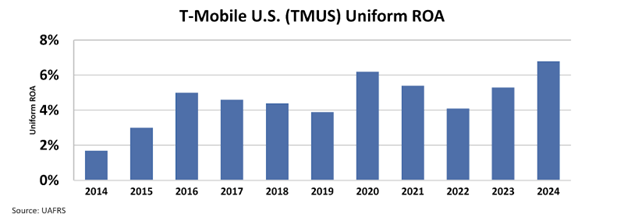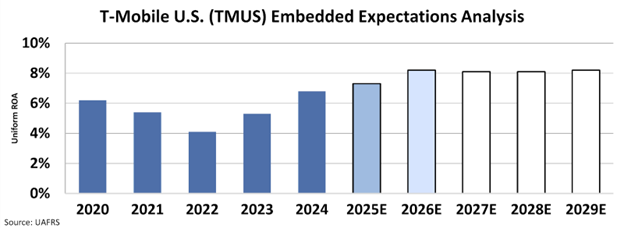Now might be the time to take profits on this telecom giant

SoftBank just sold 21.5 million T‑Mobile U.S. (TMUS) shares for $4.8 billion, bringing its total profits from the Sprint merger to nearly $26 billion since 2020.
By trimming its stake near all‑time highs, it’s signalling that T‑Mobile’s easy gains have largely been captured and the stock is fairly valued.
SoftBank is now shifting its focus and capital toward AI infrastructure, including a rumoured $30 billion push into OpenAI.
Investor Essentials Daily:
Friday News-based Update
Powered by Valens Research
SoftBank (TSE:9984) pulled off the biggest U.S. stock sale last month and it wasn’t a flashy IPO or an AI startup.
Instead, the Japanese giant offloaded 21.5 million shares of T-Mobile U.S. (TMUS) for $4.8 billion.
It’s not SoftBank’s first time taking profits from this telecom play. This latest deal brings total proceeds from T-Mobile to nearly $26 billion since 2020.
What started as a risky bet on Sprint, a communications company, has quietly morphed into a telecom cash cow.
But now, instead of doubling down, SoftBank is cashing out and pointing its capital toward AI. It’s rumored SoftBank’s preparing a massive $30 billion push into OpenAI infrastructure.
Back in 2020, SoftBank owned a majority stake in Sprint when it merged with T-Mobile in a $26.5 billion deal.
That controversial merger was supposed to save two struggling entities, and instead, it helped create a market leader.
T-Mobile quickly absorbed Sprint’s assets, expanded its network, and lured away customers from Verizon (VZ) and AT&T (T).
That’s why T-Mobile shares surged nearly 150% from the merger’s close to today, far outperforming both peers and the S&P 500.
SoftBank initially held onto its position but gradually trimmed it, most notably through a $21 billion sale in 2022. Even after that move, it remained a top shareholder with a 7.5% stake until last month.
SoftBank’s $4.8 billion sale offloaded roughly one-quarter of that remaining stake at a price of $224 per share, just 3% below T-Mobile’s recent high of $231 per share.
It wasn’t a fire sale. It was a carefully timed exit near the peak of market optimism, showing that SoftBank doesn’t expect TMUS to break out meaningfully higher from here.
SoftBank may be right, and T-Mobile’s valuation might be really close to its full potential.
We can see this through our Embedded Expectations Analysis (“EEA”) framework.
The EEA starts by looking at a company’s current stock price. From there, we can calculate what the market expects from the company’s future cash flows. We then compare that with our own cash-flow projections.
In short, it tells us how well a company has to perform in the future to be worth what the market is paying for it today.
T-Mobile’s Uniform return on assets “ROA” has been mostly around cost of capital levels for nearly two decades, before reaching 7% in 2024, driven by synergies with Sprint and improved operations.
And analysts expect Uniform ROA to gradually increase to over 8% by 2026, the highest level in the company’s history since 2005. In line with that, the market expects Uniform ROA to stay around 8% by 2029.
This shows the market gets the recent expansion in profitability and price in 2024 levels is sustainable over the long term, which makes T-Mobile reasonably valued at the moment.
SoftBank is getting out of telecom at a moment of strength. It just sold part of its T-Mobile stake near all-time highs, signaling that it views the stock as fairly valued with limited upside from here.
Rather than wait for diminishing returns, the firm is reallocating capital into artificial intelligence infrastructure, including a bold $30 billion vision to support OpenAI.
It’s unclear whether that bet will pay off. However, the decision to exit a maturing telecom position and seek new frontiers seems a reasonable strategy.
T-Mobile remains a solid operator, yet the easy gains have likely been captured. For investors, SoftBank’s timing is a reminder.
When a trade has played out, it’s often wise to take profits and look elsewhere.
Best regards,
Joel Litman & Rob Spivey
Chief Investment Officer &
Director of Research
at Valens Research






